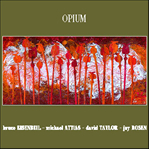|
|
 |
Dusted Reviews
Artist: Bruce Eisenbeil Album: Opium Label: CIMP Review date: Mar. 31, 2002 |

|
|
|
 |
Opium, the latest CIMP (Creative Improvisational Music Project) release to be led by the New Jersey-based guitarist, Bruce Eisenbeil, is a mesmerizing album. It is as subtle, dynamic and unpredictable as a chemistry experiment. The Opium quartet is anchored by an unusually dark-timbred horn combination consisting of David Taylor on bass trombone and Michael Attias on bass saxophone. The two work in tandem throughout the album, honking, grumbling furiously, or unleashing deep throaty yawns that simmer as they patiently drive the album forward. At points, Attias moves to the brighter sounding alto saxophone for a contrast in his soloing. Jay Rosen’s percussion alternates between the wild, humorous, and minimal, and accentuates the interaction between the two horns. He often lags slightly behind them, as if he were chasing them, and only periodically assumes the rhythmic lead. Eisenbeil’s enigmatic guitar playing, which I place somewhere in between the styles of Joe Pass and Eugene Chadbourne, also tends to hover around the periphery of the horns and takes center stage only selectively. This varied quartet comes together magically to create a continually mutating soundscape that always appears to be bubbling with tension just beneath the surface, as if it were waiting to explode at any moment.
Opium is an album of contrasts, the most significant of which is that of the thin, needle-like sound of Eisenbeil’s guitar and hearty roars of the Attias and Taylor horns. The album’s opening track, “Shadow’s Knight,” which begins with Eisenbeil noodling along the fretboard while Rosen accompanies him gently on the symbols, highlights this juxtaposition. About a minute into the song Taylor and Attias break the mood with an abrupt and startling honk. As Eisenbeil’s guitar playing grows increasingly frenetic, the two horns continue to enter the song serendipitously like a pair of ugly ducklings calling out in a storm. In songs such as “Shadow’s Knight” as well as the album’s sixth track, “Ode to Blind Joe Death,” (dedicated to the late guitarist, John Fahey) Eisenbeil and the horns appear to be on two different musical planes. Yet, their disjointedness works and the independence achieved by each instrument forms a meaningful contrast to other tracks such as “Opium 2” and the nine-minute epic, “Oklahoma Sprawl,” on which the group sounds more unified.
The theme of contrast also can be seen in the diversity of Eisenbeil’s compositions. On the one hand, a track such as “Biting Through” is incredibly controlled and develops almost painfully slowly. On the other hand, the unfettered outpouring of the album’s final song, “New Years Eve,” has drawn comparisons among my friends to a stampede of elephants and a New York City traffic jam during rush hour. In isolation, each song may veer too much to one extreme or the other. Yet, in relation to one another “Biting Through” and “New Years Eve” are complementary.
Opium is not an easy album. It requires an open-mind, concentration and a number of listenings before its subtleties and its purity of sound can begin to be appreciated. Yet, the quartet’s marvelous poise throughout the twelve tracks and their uncompromising devotion to Eisenbeil’s artistic vision make it well worth the effort. As the album’s producer, Robert D. Rusch, describes in the liner notes: “there was very little of what might be called random playing.”
By Nick Sheets
|







